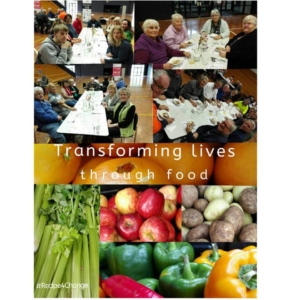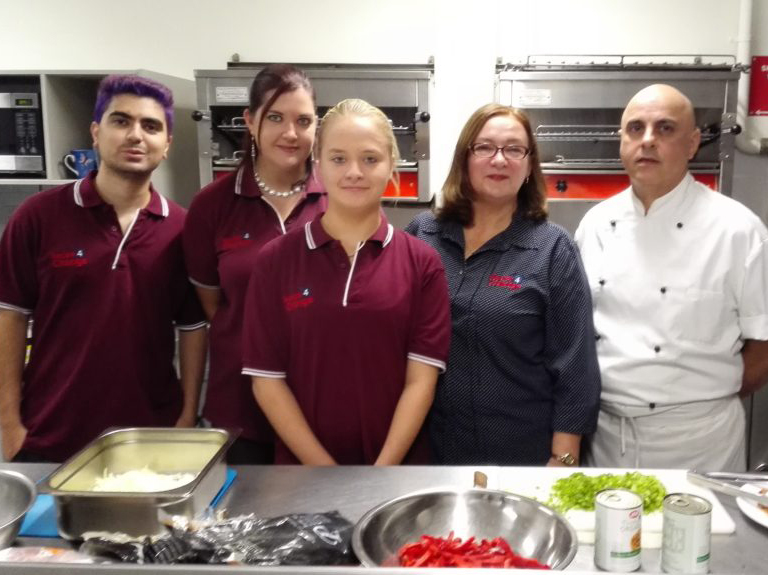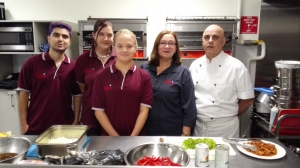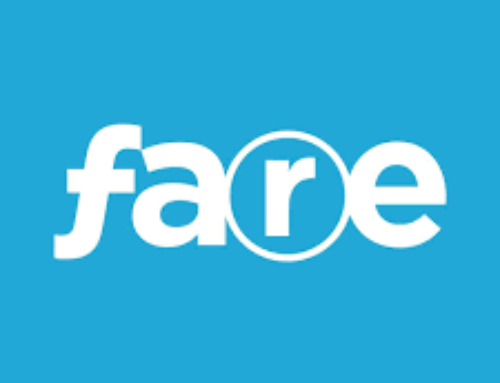Born in Yorkshire England, Christine Smith moved to Australia in 1971 and enjoyed a successful career as an employment consultant to people with disabilities and the long-term unemployed. Her aim was to understand the career aspirations of her clients and set them on the path toward their chosen field. Five and a half years ago, frustrated by the ‘box-ticking’ nature of the employment industry, Christine decided to go out on her own and start Recipe4Change (trading as Rowville Community Kitchen).
The majority of clients Christine worked with as an employment consultant had not held a steady job for up to fifteen years:
“Most had lost their social skills, they’d forgotten how to get out of bed at a certain time every day, how to have a shower every day and wear clean clothes. It’s about getting their confidence back.”
She decided to work with this community using her passion for food:
“I decided that food was the way to do it because even if you don’t particularly like food or you aren’t a foodie, everyone has to eat to survive.”
Christine Smith with members of the Rowville Community Kitchen
Christine’s mission is to assist people in re-joining the workforce, whilst simultaneously providing wholesome meals to some of the 4,600 Australians who would otherwise go hungry. She approached her previous employer Employment Plus, and together they met with the government who suggested turning her idea into a Work for the Dole program:
“If you receive a Centrelink allowance, you have to do something for the community if you aren’t working. Quite a lot of people are sent to Rowville Community Kitchen because we are a nurturing caring environment. For me, it’s about moving people from where they are today, towards where they want to go, and that doesn’t happen in a short time. For some it might take a couple of years, for some a couple of weeks. I get to know them and take them through a transitional process.”
At present, there are approximately fifty people going through the Recipe4Change program. They attend Rowville Community Kitchen from 9am to 5pm, three days a week. Participants are taken through accredited training and taught skills which can be translated to the workplace, including personal presentation:
“Some don’t believe they have anything to offer the world and we show them they do -even if it’s something simple – like doing the dishes, they get praised for that and then they step up and do different things.Our results are really good with getting people into work, we treat them as humans.”
Christine gives the example of Jake:
“He hadn’t worked since he’d left school, he had depression and a lot of other things that were preventing him getting into society. He was with us for a short while, then came back as a volunteer. We sat with him one-on-one during his training so we could talk to him about what the questions actually meant. We are very person-centered in what we do. I said to Jake ‘We need someone to look after the dishwasher’ and he suddendly took charge of it. He became accountable and responsible of his own accord and it was like ‘This is how I set it up, this is how I do it”. The end result was he’s out working.We did a short video of him and he said what he gained most from here was his hidden talent as a dishwasher.”
The kitchen is also open to those who want to help with short-term projects. Young adults with intellectual disability or those with learning disability are also invited to contribute. They are partnered with a buddy to encourage team-work. Christine ensures everyone is taught according to their skill set, however once they feel comfortable within their role, they are pushed to step outside their comfort zone.
Christine heads up a main team of six, including Jo, Chef Gregg and three valued volunteers. The team have never received a grant and yet is financially sustainable. So how does the Community Kitchen make its money?
“The agreement with the Work for the Dole program is fee for service for contact hours, so when I’m working with people onsite, I charge the government for that. We’ve done catering for local schools and businesses although not so much anymore. We also make our own jams and we sell them on-site to people who come in for lunch. We’ve now got all the labelling done properly so we can sell it outside of here.
On Thursdays, the centre invites hungry patrons to share a meal:
“People from the neighbourhood houses come in once a week over the month, the men’s shed come in every week, and we also see pensioner groups, social groups and small business people.”
First time visitors often expect a ‘soup kitchen’ and are pleasantly surprised when they are greeted upon arrival, shown to their table and served a restaurant quality two-course meal. Indeed each month a different cuisine is on the menu. Since its inception over 24,000 meals have been served to 8,650 empty bellies.
Rowville Community Kitchen works on a ‘Pay as you Feel’ basis:
“We don’t charge a specific amount; what I want you to do is think about what has gone into putting that food on that plate, from the farm gate, all the way through the supply change to what we do here and then donate accordingly. What you think it’s worth or what you can afford.”
Christine rents the building from the Knox council, with a lease for the kitchen and the community pavilion. Every six months, Christine negotiates a service fee with the government. A primary school program ‘Food4Kids ‘ is run to ensure that students and their families have access to fresh fruit and vegetables. A partnership with Second Bite ensures that the bulk of fresh fruit and vegetables is delivered once a week, with Christine completing the rest of the pickups and deliveries before or after work. A holiday program is also available with ‘soup and toastie days’ and activities in the kids playground. Launched most recently was the ‘Share Your Lunch’ initiative where Rowville Community Kitchen is appealing to local businesses to donate fresh food or join in with helping to distribute the food.
“Most of what we do is free, plus people donate to us. We are developing a business model to sell meals (our research shows there is definitely a demand for it), so we have to do different packaging and labelling, and that will give us a steady flow of income.”
Rowville Community Kitchen envisions that in a few years they will have assisted 60,000 people to re-join the workforce instilling $270,000,000 back into the community. To expand their reach, the organisation needs financial support:
“Ideally we would have $25,000 to buy a van for deliveries, because at the moment all the deliveries are done in my car and $300,000 to build a community supermarket. We do need investors, but there is a big payoff.. I am currently looking for different premises.”
Christine says that her age and experience enables her to help people while not becoming too emotionally involved in their situations:
“I don’t take it on board, I’ve seen a lot and done a lot so I am able to be empathetic but not sympathetic. I don’t judge, I just accept. They want feeding, they’ve got no food.”
If days at the kitchen don’t quite go as planned, Christine has a group of four close business friends to whom she can speak, ask advice and find solutions. To relax, she watches Shirley Valentine:
“I grew up in England, so I relate to her. We both had attitude plus at school!I’ve watched that movie hundreds of times, it’s escapism, and I always come away from it feeling peaceful.”
Christine’s other passion is animals, with her charity dollars supporting the work of the Lort Smith Animal Hospital. She likes to have a grassroots tangible impact:
“It’s about thinking ‘Where can I make a difference?'”
A co-host of ‘The Sustainability Show’ on 3MDR 97.1FM, Christine is proud that Recipe4Change saves $400 -$800 a week worth of food from going into landfill. Through the shows, she speaks on all aspects of sustainable living, and often interviews experts such as farmers.
Rowville Community Kitchen is eager to accept donations of food, but Christine stresses the food must meet certain regulations in order to be safe for consumption. Food must be uncooked and kept at certain temperatures:
“You must be aware of the chain, all the different stages of how the food has been treated”.
To join Christine for a delicious meal or to support the work of Rowville Community Kitchen, please call 1300 363 723 or e-mail [email protected]








